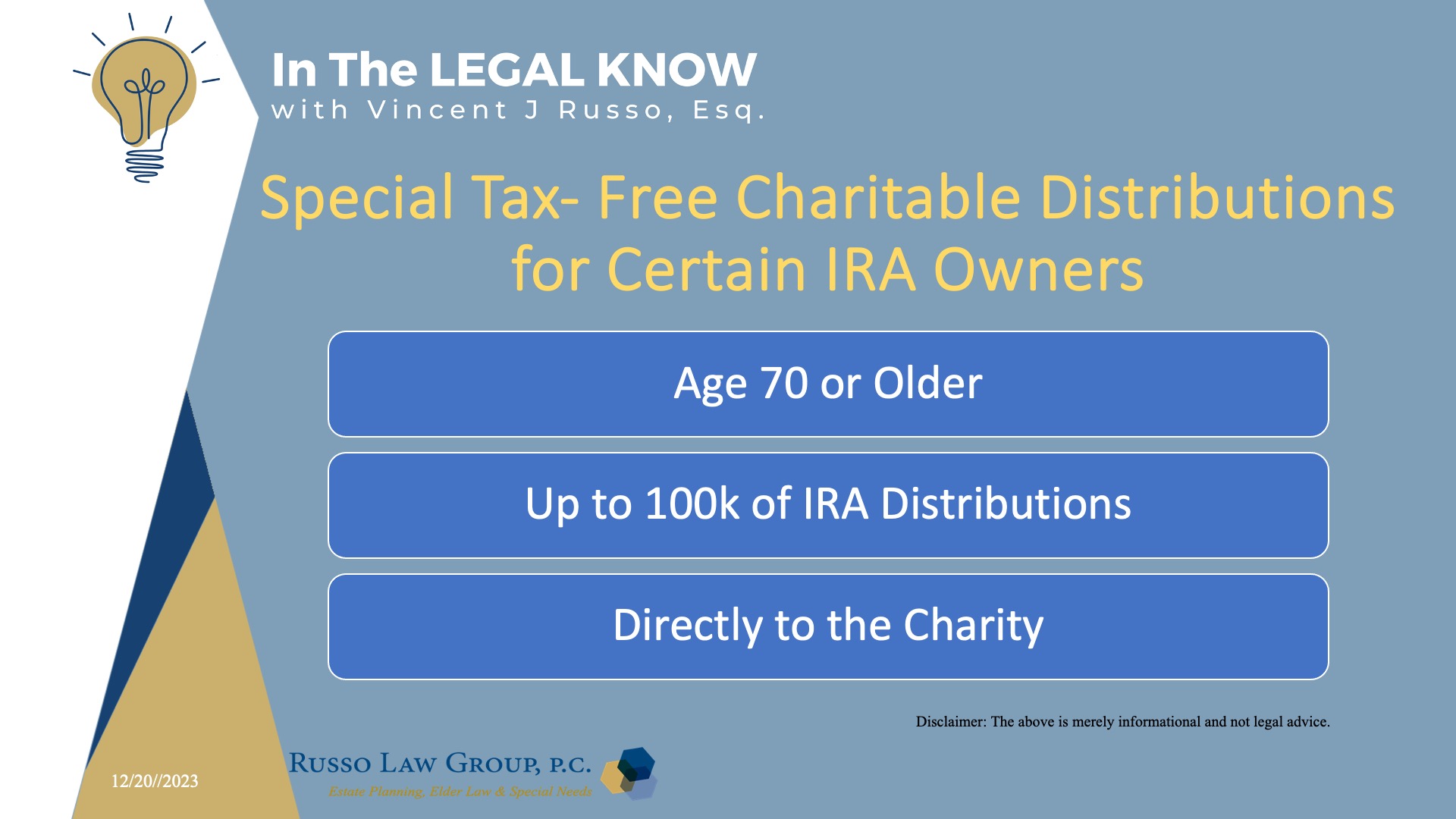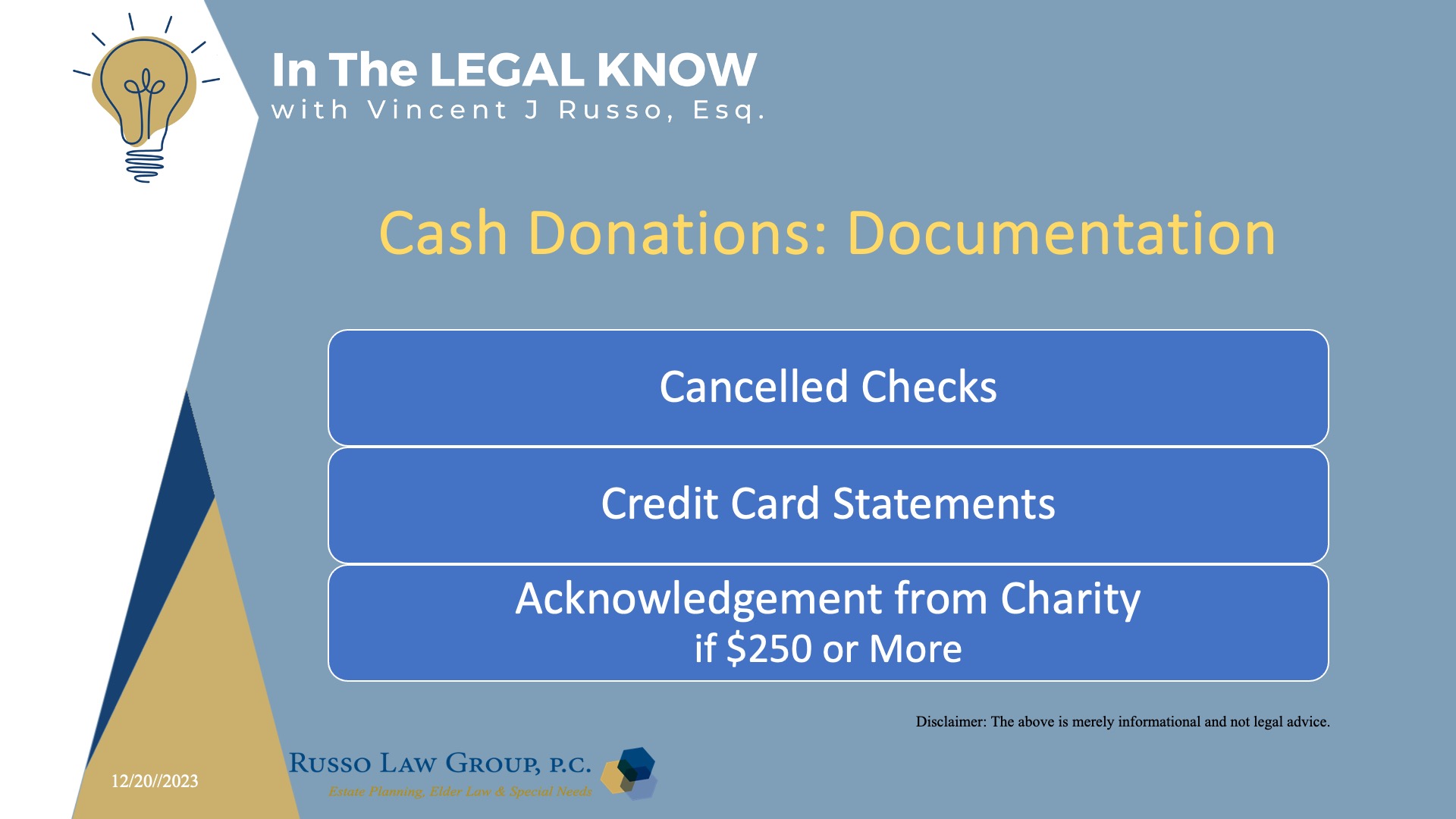This originally aired on the Catholic Faith Network’s show CFN Live: https://youtu.be/aQgwbQkJtC0 How can SSI…

Year End Charitable Giving: IRS Tips
This originally aired on the Catholic Faith Network’s show CFN Live: https://youtu.be/-YLyiKnZyFg
It is that time of year. There are just a few days left for charitable giving in 2023. Believe it or not, on December 16th, the IRS issued a news release entitled “IRS Offer Tips for Year-End Giving.”
What are some Special Tax-Free Charitable Distributions for Certain IRA Owners?
A Qualified Charitable Distribution offers older owners of individual retirement arrangements (IRAs) a different way to give to charity. As a general rule, an IRA owner, age 70½ or over, can directly transfer tax-free up to $100,000 per year to an eligible charity.
This option, first available in 2006, can be used for distributions from IRAs, regardless of whether the owners itemize their deductions. Distributions from employer-sponsored retirement plans, including SIMPLE IRAs and simplified employee pension (SEP) plans, are not eligible. To qualify, the funds must be transferred directly by the IRA trustee to the eligible charity. Distributed amounts may be excluded from the IRA owner’s income – resulting in lower taxable income for the IRA owner.
However, if the IRA owner excludes the distribution from income, no deduction, such as a charitable contribution deduction on Schedule A, may be taken for the distributed amount. Not all charities are eligible. For example, donor-advised funds and supporting organizations are not eligible recipients. Amounts transferred to a charity from an IRA are counted in determining whether the owner has met the IRA’s required minimum distribution.
Where individuals have made nondeductible contributions to their traditional IRAs, a special rule treats amounts distributed to charities as coming first from taxable funds, instead of proportionately from taxable and nontaxable funds, as would be the case with regular distributions.
For more details, look at IRS Publication 590, Individual Retirement Arrangements (IRAs).

If age 70 ½ or older, you can give up to 100k of your IRA directly to a Charity income tax free.
How do the tax laws treat gifting clothing and household items?
To be tax-deductible, as a general rule, clothing and household items donated to charity generally must be in good used condition or better.

Household items include furniture, furnishings, electronics, appliances, and linens. A clothing or household item for which a taxpayer claims a deduction of over $500 does not have to meet this standard if the taxpayer includes a qualified appraisal of the item with the return.
Donors must get a written acknowledgement from the charity for all gifts worth $250 or more that includes, among other things, a description of the items contributed.
What about cash donations?
To deduct any charitable donation of money, regardless of amount, a taxpayer must have a bank record or a written communication from the charity showing the name of the charity and the date and amount of the contribution.
Bank records include canceled checks, bank or credit union statements, and credit card statements. Bank or credit union statements should show the name of the charity, the date, and the amount paid. Credit card statements should show the name of the charity, the date, and the transaction posting date.
Donations of money include those made in cash or by check, electronic funds transfer, credit card and payroll deduction.
For payroll deductions, the taxpayer should retain a pay stub, a Form W-2 wage statement or other document furnished by the employer showing the total amount withheld for charity, along with the pledge card showing the name of the charity.
These requirements for the deduction of monetary donations do not change the long-standing requirement that a taxpayer obtain an acknowledgment from a charity for each deductible donation (either money or property) of $250 or more. However, one statement containing all the required information may meet both requirements.
Tips in the IRS News Release
The IRS has offered seven reminders to help taxpayers plan their holiday-season and year-end giving.
- Contributions are deductible in the year made. Thus, donations charged to a credit card before the end of 2023 count for 2023. This is true even if the credit card bill isn’t paid until 2024. Also, checks count for 2023 as long as they are mailed in 2023.
- Check that the organization is eligible. Only donations to eligible organizations are tax deductible. Exempt Organization Select Check, a searchable online database available on IRS.gov, lists most organizations that are eligible to receive deductible contributions. In addition, churches, synagogues, temples, mosques, and government agencies are eligible to receive deductible donations, even if they are not listed in the database.
- For individuals, only taxpayers who itemize their deductions on Form 1040 Schedule A can claim deductions for charitable contributions. This deduction is not available to individuals who choose the standard deduction (for 2023 – the individual standard deduction is $13,850 and for married it is $27,700), including anyone who files a short form (Form 1040A or 1040EZ). A taxpayer will have a tax savings only if the total itemized deductions (mortgage interest, charitable contributions, state, and local taxes, etc.) exceed the standard deduction. Use the 2013 Form 1040 Schedule A to determine whether itemizing is better than claiming the standard deduction.
- For all donations of property, including clothing and household items, get from the charity, if possible, a receipt that includes the name of the charity, date of the contribution, and a reasonably detailed description of the donated property. If a donation is left at a charity’s unattended drop site, keep a written record of the donation that includes this information, as well as the fair market value of the property at the time of the donation and the method used to determine that value. Additional rules apply for a contribution of $250 or more.
- The deduction for a car, boat or airplane donated to charity is usually limited to the gross proceeds from its sale. This rule applies if the claimed value is more than $500. Form 1098- C or a similar statement, must be provided to the donor by the organization and attached to the donor’s tax return.
- If the amount of a taxpayer’s deduction for all non-cash contributions is over $500, a properly completed Form 8283 must be submitted with the tax return.
- As always, it’s important to keep good records and receipts.

Charities need your help, and you will feel better when you help others.
We hope you found this article helpful. Contact our office today at 1 (800) 680-1717 and schedule an appointment to discuss what makes sense for you and your loved ones.



This Post Has 0 Comments